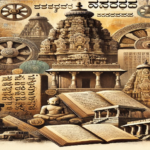All the WH Words in Kannada for Conversations
By Aditya Pratap Bhuyan
Copyright © 2025 Learn Kannada Easy. All rights reserved.
WH words are essential in daily conversations, and knowing how to use them properly can help you communicate effectively in Kannada. In this guide, we’ll explore all the WH words, along with their meanings, examples, and transliterations.
1. What – ಏನು (Ēnu)
Used to ask about things, actions, or situations.
- Example 1: ನೀವು ಏನು ಮಾಡುತ್ತಿದ್ದೀರಿ? (Nīvu ēnu māḍuttiddīri?)
Translation: What are you doing? - Example 2: ಊರದಲ್ಲಿ ಏನು ನಡೆಯುತ್ತಿದೆ? (Ūradalli ēnu naḍeyuttide?)
Translation: What is happening in the town? - Example 3: ನಾನು ಏನು ಕೇಳಬೇಕೆಂದು ನೀವು ಭಾವಿಸುತ್ತೀರಿ? (Nānu ēnu kēḷabēkendu nīvu bhāvisuttīri?)
Translation: What do you think I should ask? - Example 4: ನೀವು ಏನು ತಿಂದಿದ್ದೀರಿ? (Nīvu ēnu tindiddīri?)
Translation: What did you eat?
2. Where – ಎಲ್ಲಿ (Ellī)
Used to inquire about the location or place of something or someone.
- Example 1: ನೀವು ಎಲ್ಲಿ ಹೋಗುತ್ತಿದ್ದೀರಿ? (Nīvu ellī hōguttiddīri?)
Translation: Where are you going? - Example 2: ಅವನು ಎಲ್ಲಿ ಇದ್ದಾನೆ? (Avanu ellī iddāne?)
Translation: Where is he? - Example 3: ನಮ್ಮ ಶಾಲೆ ಎಲ್ಲಿ ಇದೆ? (Nam’ma śāle ellī ide?)
Translation: Where is our school? - Example 4: ನೀವು ಎಲ್ಲಿ ಇದ್ದೀರಿ? (Nīvu ellī iddīri?)
Translation: Where are you?
3. Who – ಯಾರು (Yāru)
Used to inquire about a person or people.
- Example 1: ಅವರು ಯಾರು? (Avaru yāru?)
Translation: Who are they? - Example 2: ನೀವು ಯಾರು? (Nīvu yāru?)
Translation: Who are you? - Example 3: ಈ ವ್ಯಕ್ತಿ ಯಾರು? (Ī vyakti yāru?)
Translation: Who is this person? - Example 4: ನಾನು ಯಾರು ಎಂದು ನೀವು ಹೇಳಿದಿರಿ? (Nānu yāru endu nīvu hēḷidiri?)
Translation: Who did you say I am?
4. When – ಯಾವಾಗ (Yāvāga)
Used to inquire about time or a specific moment when something will happen.
- Example 1: ನೀವು ಯಾವಾಗ ಬರುವುದು? (Nīvu yāvāga baruvudu?)
Translation: When will you come? - Example 2: ಅವರು ಯಾವಾಗ ಹಾರಿದನು? (Avaru yāvāga hāridanu?)
Translation: When did he fly? - Example 3: ನಮ್ಮ ಪೋಷಕರು ಯಾವಾಗ ಬರುತ್ತಾರೆ? (Nam’ma pōṣakaru yāvāga baruttāre?)
Translation: When will our parents arrive? - Example 4: ಅವಳು ಯಾವಾಗ ಹಿಂತಿರುಗುತ್ತದೆ? (Avaḷu yāvāga hin’tiruguttade?)
Translation: When will she return?
5. Why – ಏಕೆ (Ēke)
Used to ask about the reason or cause of something.
- Example 1: ನೀವು ಏಕೆ ಕೇಳುತ್ತಿದ್ದೀರಿ? (Nīvu ēke kēḷuttiddīri?)
Translation: Why are you asking? - Example 2: ಅವರು ಏಕೆ ಕೋಪಗೊಂಡಿದ್ದಾರೆ? (Avaru ēke kōpagoṇḍiddāre?)
Translation: Why are they angry? - Example 3: ನೀವು ಏಕೆ ಈ ಕೆಲಸ ಮಾಡುತ್ತೀರಿ? (Nīvu ēke ī kelasa māḍuttīri?)
Translation: Why are you doing this task? - Example 4: ಅವನಿಗೆ ಏಕೆ ಹೊರಟುಹೋಗಿದೆ? (Avanige ēke horaṭu hōgide?)
Translation: Why did he leave?
6. How – ಹೇಗೆ (Hēge)
Used to ask about the manner or way something is done.
- Example 1: ನೀವು ಹೇಗೆ ಬೋಧಿಸುತ್ತೀರಿ? (Nīvu hēge bōdhisuttīri?)
Translation: How do you teach? - Example 2: ಅವರು ಹೇಗೆ ಓದುತ್ತಾರೆ? (Avaru hēge ōduttāre?)
Translation: How do they read? - Example 3: ನೀವು ಹೇಗೆ ಸಹಾಯ ಮಾಡುತ್ತೀರಿ? (Nīvu hēge sahāya māḍuttīri?)
Translation: How do you help? - Example 4: ಅವನು ಹೇಗೆ ಹಾಡುತ್ತಾನೆ? (Avanu hēge hāḍuttāne?)
Translation: How does he sing?
7. Which – ಯಾವ (Yāva)
Used to inquire about a specific item or choice among many.
- Example 1: ನೀವು ಯಾವ ಬಟ್ಟೆ ಆಯ್ಕೆಮಾಡಿದೀರಿ? (Nīvu yāva baṭṭe āykemāḍidīri?)
Translation: Which shirt did you choose? - Example 2: ನೀವು ಯಾವ ವೀಡಿಯೊವನ್ನು ನೋಡಬೇಕೆಂದು ಇಚ್ಛಿಸುತ್ತೀರಿ? (Nīvu yāva vīḍiyōvan’nu nōḍabēkendu ic’c’isuttīri?)
Translation: Which video do you want to watch? - Example 3: ಅವರು ಯಾವ ಪ್ರಾಂತದಿಂದ ಬಂದಿದ್ದಾರೆ? (Avaru yāva prāntadinda bandiddāre?)
Translation: Which region do they come from? - Example 4: ನೀವು ಯಾವ ತರಹದ ಕೆಲಸ ಮಾಡುತ್ತೀರಿ? (Nīvu yāva tarahada kelasa māḍuttīri?)
Translation: Which type of work do you do?

